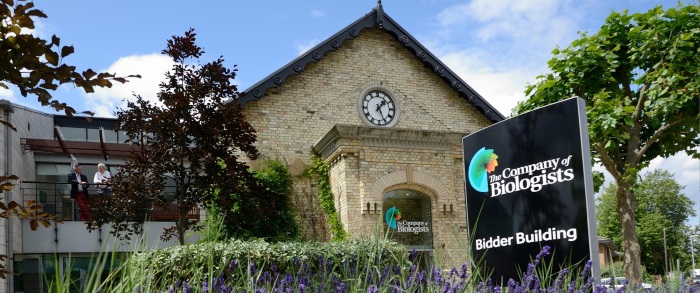
4 January 2021
Despite the numerous challenges of 2020, The Company of Biologists had an incredibly successful year with a lot of long-term projects and new ventures coming to fruition. Here’s a lowdown of our lowdown of 2020.
January – the Node Network launches
We began the year full of excitement for the launch of the Node Network, a global directory of developmental and stem cell biologists. Entirely inclusive, the Network is open to any member of the developmental and stem cell biology community, at all career stages. It is designed to help promote diversity in the field, providing information on scientific field, model organism, place of work and career stage, as well as giving members the option to disclose gender, race/ethnicity, LGBTQ+ identity and disability status. If you are looking for someone in the field for a conference, to referee or to speak at a seminar, definitely have a look through the Network.
March – lockdown begins
Like everyone around the world, our biggest battle of the year was COVID-19. A week before the official lockdown was announced on 23 March, everyone at The Company of Biologists packed up their desks and headed home. As we said goodbye, there were joking calls of ‘See you at Christmas!’ anticipating we would only be away for a few months at tops. December is our eighth month of working from home and while there isn’t a fixed end in sight, we will keep going until it’s safe to return to the office.
May – Biology Open announces new Future Leader Reviews
Biology Open is a strong advocate for early-career researchers, publishing interviews with first authors, encouraging early-career researchers to be involved in reviewing and providing grants to help young researchers attend conferences around the world. This year, BiO added another string to its early-career researcher bow in the form of Future Leader Reviews. Aimed exclusively at early-career researchers with less than ten years active research experience post-PhD, the new Review articles are an opportunity for those in the first phases of their scientific career to establish themselves in their field.
July – FocalPlane launches
The third addition to our rostra of community sites, FocalPlane launched in the summer after much anticipation. The idea for a microscopy community site was first born in 2018, and the team spent the next two years carefully devising a trusted online space for microscopy. As a discipline, microscopy is used across all fields of biology but there is still a gap in knowledge sharing between experts and non-experts. FocalPlane bridges that gap as a community space for microscopists and biologists to share news, events and resources, all with the aim of promoting interactions and fostering connections within the community.
August – three of our our journals are awarded Transformative Journal status
The biggest business news of the year came in August, when we were not only the first not-for-profit publisher to commit to the Transformative Journal approach, but also the publisher of the first journals awarded Transformative Journal status by Plan S. Over a transition period, our three hybrid journals – Development, Journal of Cell Science and Journal of Experimental Biology – will gradually increase the number of Open Access articles they publish. By choosing the transformative approach, we are acknowledging that not all of our authors are ready for Open Access. This model ensures every author in our community can continue to publish with us, whatever their funder or financial status.
September – Development 2020 goes virtual
With the whole world transitioning to online events, we were no different and in September we hosted our first virtual conference. The bi-yearly Development Meeting is a highlight in the calendar for developmental biologists, and is well-known for its excellent opportunities to network and interact. Having attended plenty of virtual events over the summer, we knew that the hardest part of an online conference was the networking. Our Events Team and the Development team hosted a multi-day meeting in Remo that received positive feedback from attendees, speakers and sponsors alike. While there’s always room for improvement, the success of our first virtual event confirmed that despite COVID-19, we can still meet virtually for a valuable week of sharing ideas and research.
October – the new Sustainable Conferencing Initiative launches
Already in the pipeline pre-COVID, our Sustainable Conferencing Initiative is a new venture that is perhaps even more relevant in the midst of pandemic life. Answering the urgent need to find new ways for scientists to interact that are greener and more accessible than traditional conference models, the Initiative, spearheaded by Directors Sally Lowell, Alastair Downie, Kate Storey and Holly Shiels, will provide technical, logistical and financial support to help biologists make their conferences more sustainable. We’re currently on the look-out for case studies of new technology and virtual formats, so please do get in touch to share your thoughts.
November – an update on Read & Publish
Launched officially in 2019, we can’t see the year out without acknowledging the success of the first year of our Read & Publish initiatives. We were one of the first not-for-profit publishers to offer Read & Publish agreements and since its launch, we are delighted that over 50 institutions from 9 countries can now benefit from free, uncapped Open Access publishing and unlimited access to our three hybrid journals. In November we proudly welcomed five additional institutions to the initiative from Australia, Canada, Germany, the Netherlands and the US.
For a year where no one really went anywhere, we have achieved a lot and have launched new initiatives that we are extremely proud of. It hasn’t been an easy year for anyone, and we would like to thank our community of authors, Editors, reviewers and staff for their enduring support and hard work. We really couldn’t have done it without you.
Happy New Year!








You must be logged in to post a comment.